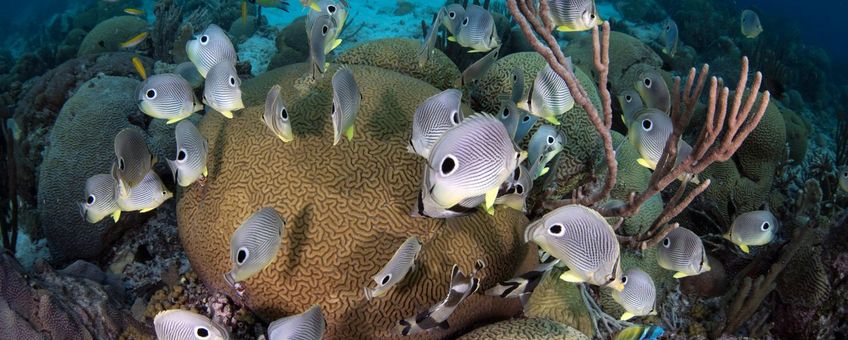
Pioneering larval propagation for coral reef restoration
Carmabi, Dutch Caribbean Nature Alliance (DCNA), Secore InternationalThe presentation given by Kelly Latijnhouwers, from SECORE International and the CARMABI Research Station, underscored the importance of improving our scientific understanding of coral life cycles to enhance restoration efforts. This includes understanding proper techniques for gamete collection (reproduction material) and larval rearing (including the process of fertilization and embryogenesis), but also settlement (maximizing likelihood of larvae settling onto substrates), outplanting and monitoring (planting young corals back onto the reef and monitoring their growth over time).
Recent Improvements
 Early restoration efforts faced low fertilization success, limited knowledge on reproductive timing, and high costs due to large-scale settlement and rearing requirements. Luckily, recent years have seen this improvement due to better techniques for larval culture maintenance, and improved understanding of settlement cues, enhancing the overall effectiveness of restoration efforts.
Early restoration efforts faced low fertilization success, limited knowledge on reproductive timing, and high costs due to large-scale settlement and rearing requirements. Luckily, recent years have seen this improvement due to better techniques for larval culture maintenance, and improved understanding of settlement cues, enhancing the overall effectiveness of restoration efforts.
During the Reef Restoration Workshop, Kelly Latijnhouwers presented several innovative tools and technologies aimed at increasing the success of field-based coral restoration. These include Coral Rearing In-Situ Basins (CRIB), protected in-water basins which have significantly increased the scale and transferability of coral breeding, making large-scale restoration efforts more feasible and cost-effective. In addition, techniques such as heterotrophic feeding, which involves feeding coral settlers with natural plankton, has been shown to improve post-outplanting survival rates by enhancing settler fitness prior to outplanting.

Significance for the Dutch Caribbean
The insights and advancements discussed during the workshop hold valuable implications for the Dutch Caribbean, an area rich in marine biodiversity, but increasingly threatened by climate change and human activities. By adopting these larval propagation techniques and restoration strategies, the Dutch Caribbean can:
- Enhance biodiversity. Improved coral restoration methods can help restoring damaged reefs, ensuring the survival of diverse marine species.
- Boost coastal protection: Healthy coral reefs act as natural barriers against storms and erosion, protecting coastal communities and economies.
- Promote sustainable tourism. Vibrant coral reefs attract tourists, providing economic benefits to local communities.
The Reef Restoration Workshop showcased significant progress in coral larval propagation, offering hope and practical solutions for restoring coral reefs in the Dutch Caribbean. The ongoing efforts and continued innovation in this field are crucial for maintaining the ecological and economic health of the region's marine environments.

More information
- Watch the presentation Larval propagation and its field-based applications.
- Stay tuned for more articles in this coral reef restoration series, where we will delve deeper into the topics discussed during the workshop, highlighting the critical work being done to preserve these vital marine ecosystems.
This workshop is funded by the Ministry of Agriculture, Nature and Food Quality (LNV) and supported by the Dutch Postcode Lottery. Kelly Latijnhouwers’ participation in the workshop was sponsored by Diergaarde Blijdorp.
Text: Secore International, CARMABI and Dutch Caribbean Nature Alliance
Photos: Kelly Latijnhouwers; Paul Selvaggio
